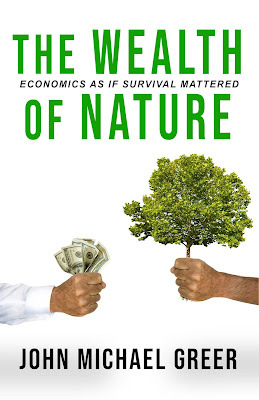The Wealth of Nature
Nov. 11th, 2021 01:46 pm I'm delighted to announce that the print edition my book on ecological economics, The Wealth of Nature, is now availabl4e despite a flurry of production delays. (It's not just toilet paper that's had shortages.) The publisher, Founders House, has had to move operations to a new printer and make new arrangements for sales and shipping. The new page for ordering copies of The Wealth of Nature is here, and the Founders House online store can be found here; it's still under construction at this time. (Most of my Founders House titles can also be ordered from my Bookshop store here.)
I'm delighted to announce that the print edition my book on ecological economics, The Wealth of Nature, is now availabl4e despite a flurry of production delays. (It's not just toilet paper that's had shortages.) The publisher, Founders House, has had to move operations to a new printer and make new arrangements for sales and shipping. The new page for ordering copies of The Wealth of Nature is here, and the Founders House online store can be found here; it's still under construction at this time. (Most of my Founders House titles can also be ordered from my Bookshop store here.)As for The Wealth of Nature itself, here's the blurb:
"The Wealth of Nature proposes a new model of economics based on the integral value of ecology. Building on the foundations of E.F. Schumacher's revolutionary "economics as if people mattered", this book examines the true cost of confusing money with wealth. By analyzing the mistakes of contemporary economics, it shows how an economy centered on natural capital—the ecological cycles that support human life—can move our society toward a more productive relationship with the planet that sustains us all. Profoundly insightful and impeccably argued, this book is required reading for anyone interested in the intersection of the environment and the economy as we enter the twilight of the Age of Abundance."
As the Age of Abundance vanishes in the rearview mirror, and the Age of Empty Store Shelves replaces it, this book seems morre than usually relevant!
The Wealth of Nature
Date: 2021-11-12 08:12 pm (UTC)Some things have changed since the book was published, in 2011. The problem of peak oil was delayed by fracking, although we could have a debate about the way the price of oil was kept low by creative accounting in the fracking industry. Hmm. Who will pay for that in the long run, as those companies go bankrupt? Then, the fall in the cost of renewable electricity has changed the energy landscape.
A second unexpected change is Modern Monetary Theory, which looks at debt in a different light.
These changes do not change the thought provokingness of the text. I wonder what will happen next. And fuck Milton Friedman